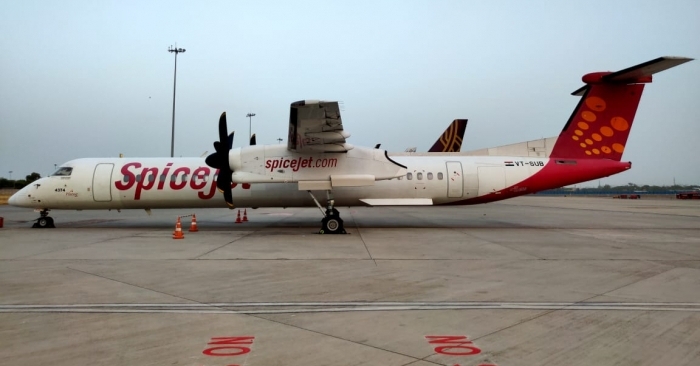SpiceJet expands freighter fleet to eight; converts three Q400 aircraft
May 28, 2020: The Indian carrier SpiceJet has converted three of its Bombardier Q400 passenger aircraft into freighters and thus expanded its dedicated freighter fleet to eight along with five SpiceXpress flights.

May 28, 2020: The Indian carrier SpiceJet has converted three of its Bombardier Q400 passenger aircraft into freighters and thus expanded its dedicated freighter fleet to eight along with five SpiceXpress flights.
The three converted Q400 cargo planes will be used for operations to smaller tier II & III cities and towns.
Ajay Singh, chairman & managing director, SpiceJet, said, “Our cargo operations are doing extremely well and to address the increased demand we have converted three Q400 passenger aircraft into freighters. These are our old 78-seater Q400s and have a cargo capacity of 8.5 tons each. These smaller cargo planes are perfectly suited for operations to Tier II & III cities and remote and hilly areas in the North East, Jammu & Kashmir, Himachal Pradesh.”
“There is an opportunity in every crisis and at SpiceJet, we have been constantly innovating and adapting to changing situations. Today, our cargo network spans over 25 international destinations most of which we added during the lockdown period. We see tremendous potential in the cargo business and will continue to expand in the times to come.”
SpiceJet has transported over 12,000 tons of cargo on more than 1690 flights since the nation-wide lockdown began transporting medical and surgical supplies, sanitizers, face masks, coronavirus rapid test kits, IR thermometers etc. and providing doorstep deliveries of essential supplies, medicines and medical equipment to various cities in India.
The airline has expanded its international cargo network operating cargo flights to and from Sudan, South Korea, Cebu, Huangzhou, Tashkent, Baghdad, Cambodia, Guangzhou, Abu Dhabi, Kuwait, Singapore, Ho Chi Minh, Hong Kong, Shanghai, Bangkok, Colombo, Dubai, Kabul, Myanmar, Sharjah, Male, Kuala Lumpur, Ukraine, Nepal, Indonesia and a host of other places.
The airline had launched its dedicated cargo arm, SpiceXpress, in September 2018. SpiceJet operated the country’s first cargo-on-seat flight on April 7 carrying vital supplies in passenger cabin & belly space. Since then, the airline has been regularly deploying its B737 and Q400 passenger aircraft to carry cargo in the passenger cabin.



